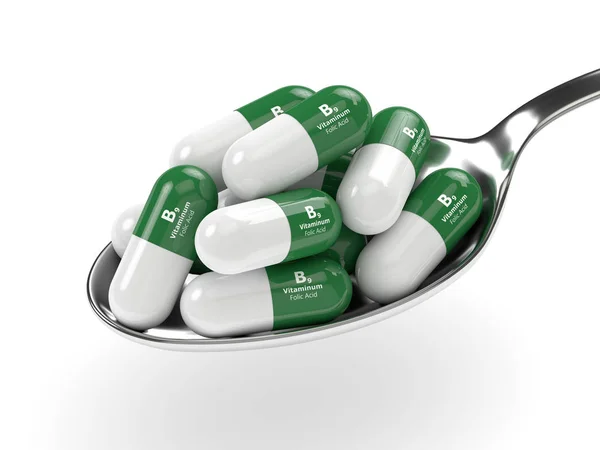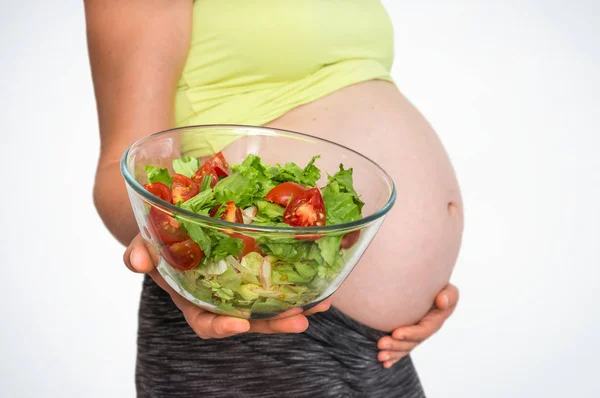From Pregnancy to Energy Levels are the many roles of vitamin B9 during pregnancy. Vitamin B9, also known as folate or folic acid, is a water-soluble vitamin that plays an essential role in several functions of the body. It is one of the eight B vitamins and is vital for maintaining overall health and well-being. The human body cannot produce Vitamin B9 on its own, so it must be obtained through diet or supplementation.
Folate is the naturally occurring form of Vitamin B9 found in foods, while folic acid is the synthetic version used in supplements and fortified foods. Both forms are converted into their active form, methyltetrahydrofolate (MTHF), in the liver before being utilized by cells throughout the body.
Vitamin B9 has many important functions in our bodies, from promoting healthy cell growth to aiding in red blood cell production. It also works closely with other B vitamins to support energy metabolism and maintain a healthy nervous system.

Here are the amazing roles of vitamin B9 during pregnancy.
Boosts Energy Levels
Pregnancy can be physically exhausting for many women due to hormonal changes and increased demand on their bodies. Vitamin B9 is involved in various metabolic processes within the body, including the breakdown of carbohydrates, proteins, and fats. These macronutrients are our primary sources of energy, and with the help of Vitamin B9, they can be efficiently converted into usable energy. This makes it an essential nutrient for individuals looking to increase their energy levels.
During Pregnancy: Reduces Risk of Preeclampsia
Preeclampsia is a potentially dangerous condition characterized by high blood pressure and damage to organs such as the liver and kidneys during pregnancy. Studies have shown that adequate intake of Vitamin B6 may help reduce the risk of preeclampsia by improving blood flow to the placenta.
Prevents Birth Defects
For pregnant women, one of the primary reasons why vitamin B9 is crucial is its role in preventing birth defects. Adequate intake of folic acid is crucial during the first trimester as it helps prevent neural tube defects such as spina bifida and anencephaly. In fact, studies have shown that supplementing with folic acid before conception and during early pregnancy can reduce the risk of neural tube defects by up to 70%.
Furthermore, vitamin B9 also plays a vital role in preventing other types of birth defects such as cleft lip and palate, heart abnormalities, limb deformities, and urinary tract defects. These conditions can have long-lasting effects on a child’s health if not prevented during pregnancy.
Impact Brain Function and Mood
Vitamin B, also known as the “happy vitamins”, has been linked to improving memory, concentration, and overall cognitive performance. This is because it aids in the production of neurotransmitters such as serotonin, dopamine, and GABA – all of which play a crucial role in regulating mood and emotions.
Moreover, studies have shown that vitamin B9 deficiencies can contribute to mental health disorders such as depression and anxiety. This is due to its role in supporting the production of serotonin – often referred to as the “happy hormone”. When levels of serotonin are low, individuals may experience symptoms such as low mood, irritability, and fatigue.
On the other hand, adequate intake of vitamin B has been associated with improved mood and reduced symptoms of depression. In fact, some psychiatrists even prescribe vitamin B supplements alongside traditional antidepressants to enhance their effectiveness.
Aside from impacting brain function directly through neurotransmitter production, vitamin B also helps regulate stress hormones like cortisol. Chronic stress and high levels of cortisol have been linked to various mental health issues, and vitamin B helps keep these hormones in check. For more tips on brain function, check out these 9 Brain-Boosting Foods to Enhance Your Cognitive Function
Boosts Immune System
Vitamin B9 plays a vital role in maintaining a healthy immune system by supporting the production and function of white blood cells – the body’s first line of defense against infections. Studies have shown that individuals with higher levels of folate have stronger immune responses compared
Aids in DNA synthesis
Another significant role that Vitamin B9 plays in boosting energy levels is its involvement in DNA synthesis – the process by which new cells are created to replace old or damaged ones. As cells rapidly divide during periods of growth or injury repair, having enough Vitamin B9 is crucial for maintaining adequate energy levels to support these processes.
Supports Healthy Hair, Skin, and Nails
Pregnancy can cause changes in hair, skin, and nail health due to hormonal fluctuations. Vitamin B7 (biotin) is essential for maintaining healthy hair, skin, and nails, making it an important nutrient for expectant mothers.
Reduces Risk of Postpartum Depression
Postpartum depression affects many new mothers and can have adverse effects on both mother and baby. Research has shown that Vitamin B6 may help reduce the risk of postpartum depression by aiding in the production of neurotransmitters that regulate mood.
Reduces Risk of Cardiovascular Disease
One of the major roles of Vitamin B9 is to regulate homocysteine levels in the body. Homocysteine is an amino acid that can cause damage to blood vessels and increase the risk of cardiovascular disease. Vitamin B9 helps convert homocysteine into harmless substances, thus reducing the risk of heart disease.
Supports Mental Health
Research has shown a strong link between low levels of Vitamin B9 and mental health issues such as depression and anxiety. This may be due to its role in producing neurotransmitters like serotonin which play a crucial role in regulating mood. Adequate intake of folate has been found to improve symptoms in those suffering from depression and may also help prevent cognitive decline associated with aging.
Supports Healthy Red Blood Cell Production
Vitamin B is a crucial nutrient that plays many important roles in the human body, from pregnancy to energy levels. One of its key functions is its involvement in red blood cell production. Red blood cells are responsible for carrying oxygen throughout the body and removing carbon dioxide, making them essential for maintaining overall health and vitality.
There are several different types of vitamin B that contribute to red blood cell production, including B6, B9 (folate), and B12. Each of these vitamins has a specific role in the production and maintenance of healthy red blood cells.
Firstly, vitamin B6 helps in the formation of hemoglobin – the protein inside red blood cells that carries oxygen. It also aids in the synthesis of heme, a component of hemoglobin that gives it its deep red color. Without sufficient levels of vitamin B6, there can be decreased levels of hemoglobin and ultimately less efficient transport of oxygen by red blood cells.
Next, folate or vitamin B9 is crucial for producing new red blood cells as well as repairing damaged ones. Folate deficiency can lead to anemia – a condition characterized by low levels of healthy red blood cells – which can cause fatigue, weakness, shortness of breath and other symptoms associated with poor oxygen transport.
Vitamin B12 works closely with folate in promoting healthy red blood cell production. It also aids in DNA synthesis and maintenance within red blood cells through its involvement in methylation reactions. Methylation ensures proper gene expression within all cells but is especially important in red blood cells as it helps maintain their proper shape and function.
In addition to their individual roles, vitamin B6, B9, and B12 also work together synergistically to support red blood cell production. For example, vitamin B12 deficiency can cause a decrease in folate levels, leading to anemia even if enough folate is present. This highlights the importance of maintaining adequate levels of all B vitamins for optimal red blood cell production.
How Much Vitamin B9 Do You Need?

The recommended daily intake of vitamin B varies depending on age, gender, and other factors such as pregnancy and breastfeeding. In general, the daily recommended intake for adults ranges from 1.1-2.4 mg per day, with pregnant and breastfeeding women requiring higher amounts.
Pregnant women may need up to 2.6 mg of vitamin B9 (folic acid) per day to support the growth and development of their baby’s neural tube. Folic acid is vital for proper brain and spinal cord formation in the first weeks of pregnancy when many women may not even know they are pregnant yet.
Breastfeeding mothers should also aim for an increased intake of vitamin B9, which helps with the production of breast milk and supports their own energy levels postpartum.
For children and teenagers, the recommended daily intake varies depending on age. These limits are 300 mcg for 1-3 years of age, 400 mcg for 4-8 years of age, 600 mcg for 9-13 years of age, and 800 mcg for 14-18 years of age. Older adults may require higher amounts due to decreased absorption in their digestive systems.
Vegetarians and vegans are at risk of vitamin B9 deficiency as it is primarily found in also animal-based foods such as meat, fish, eggs, and others.
Therefore if you follow a plant-based diet or have dietary restrictions that limit your intake of certain foods, it is essential to consult with a healthcare professional about supplementation to ensure you are meeting your daily needs.
Best Sources of Vitamin B9 During Pregnancy

To ensure that you are getting enough Vitamin B9 during your pregnancy, here are some of the best food sources you can include in your daily diet:
1. Dark Green Leafy Vegetables
Vegetables like spinach, kale, broccoli, and Brussels sprouts are excellent sources of folate. They are also rich in other essential vitamins and minerals needed for a healthy pregnancy, such as iron and vitamin C.
2. Legumes
Legumes such as lentils, chickpeas, black beans, and kidney beans are not only high in protein but also contain significant amounts of folate. They make for a great addition to any meal or can be used as a delicious plant-based protein source.
3. Citrus Fruits
Oranges, grapefruits, lemons, and other citrus fruits are packed with vitamin C and folate. These fruits not only provide immune-boosting benefits but also help with the absorption of iron from plant-based sources.
4. Avocado
Avocados are not only a tasty addition to any meal, but they are also high in folate and other essential nutrients like healthy fats and fiber. They make for an easy and nutritious snack during pregnancy.
5. Fortified Cereals and Grains
Many breakfast cereals and grains are fortified with folic acid, making them a convenient way to boost your folate intake. However, be sure to check the labels as some of these products can be high in sugar and unhealthy additives.
6. Eggs
Eggs are an excellent source of many important nutrients, including Vitamin B9. They also contain choline, which is crucial for fetal brain development.
7. Liver
Organ meats like liver are incredibly nutrient-dense and contain high amounts of folate. However, pregnant women should limit their intake of liver due to its high levels of vitamin A, which can be harmful in large doses.
In addition to these food sources, pregnant women may also need to take a folic acid supplement recommended by their healthcare provider to ensure they are getting enough Vitamin B9 during pregnancy.
Note: This article is written based on scientific evidence found by the soundhealthandlastingwealth.com team. Sources are duly referenced with keywords hyperlinked to source websites and are clickable for reference.







